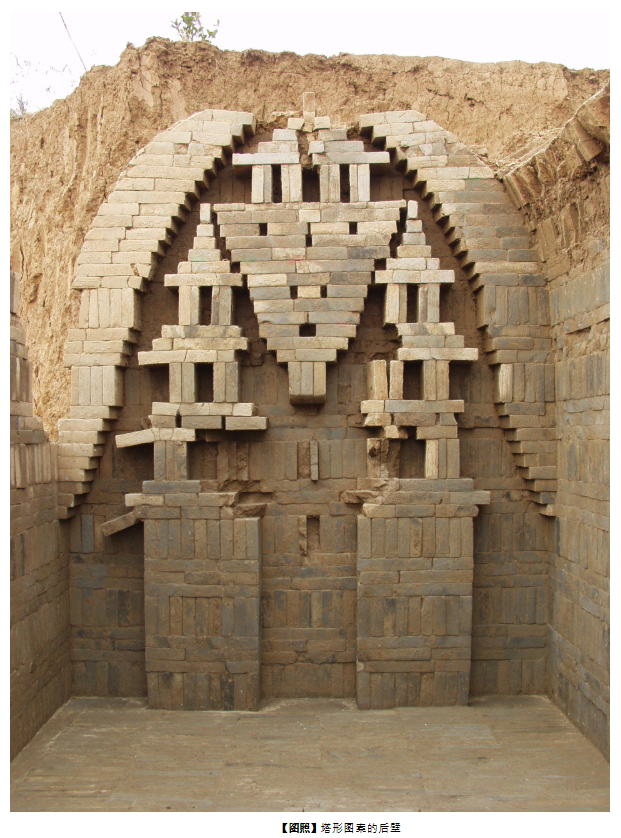
남경 강녕 호촌 남조묘 고고발굴 南京江宁胡村南朝墓考古发掘
남경南京 호촌胡村 남조묘南朝墓는 강소성江蘇省 남경시南京市 강녕구江宁区 강녕진江宁镇 호촌胡村 북쪽 진산陈山 동쪽 기슭에 위치한다.
2006년 초, 강녕진江宁镇 陈塘大队轮窑厂가 취토取土하는 과정에서 고대 벽돌묘[砖墓] 1기가 출현하자, 그해 10월부터 12월까지 남경시박물관南京市博物馆 고고부考古部에서 발굴조사를 실시했다. 발굴면적은 대략 50평방미터다.
조사결과 남조시대 전형적인 벽돌무덤으로 드러났다. 전체 길이 7m, 너비 최장 2.24m로 과거 발굴된 동시대 묘장墓葬에 견주어 규모가 비교적 크다.
묘실墓室 후벽後壁 구조가 독특한 양상을 보인다. 앞 사진에서 제시한 것처럼 후실 벽면에다가 벽돌을 돌출시켜 양쪽으로 탑 모양을 구현한 다음, 그 양쪽 사이 상부에다가 또 다른 탑을 벽돌을 빼서 구현한 양상이다. 화상전画像砖과 화문전花纹砖을 사용했는데, 전면에서 바라보면 세 탑이 마치 '品' 자를 이루는 모양이다.
양쪽에 배치한 두 탑이 상대적으로 크고 그 중앙 상부 탑은 상대적으로 작다. 화문전花纹砖을 장식한 문양으로는 연화문莲花纹, 전지화문缠枝花纹, 보병화문宝瓶花纹 등이 있다. 화상전画像砖을 장식한 문양은 신수문神兽纹, 비천문飞天纹, 시남시녀상侍男侍女像이 있다.
이 묘는 일찍이 도굴 피해를 보아 출토 유물이 적다. 청자기青瓷器 도기陶器 석기石器 도합 16件이 수습됐다. 청자기로는 발钵 잔盏 반盘 및 반구호盘口壶가 있다. 도기陶器는 두 건인데 모두 무사용武士俑이다. 석기石器는 돼지[猪]와 여용女俑이 있다.
규모로 보아 묘주墓主는 상시 떵떵거러던 가문 일원임이 확실하다.
묘실 북쪽 벽을 장식한 탑 조형은 묘주가 불교신앙과 밀접한 관계였음을 암시한다.
*** 미륵사지 가람배치는 금당과 석탑이 각 세 개씩인 3금당 3탑이라는 점이 독특한데 그 의문의 일단을 혹 이 무덤이 풀어줄지도 모르겠다.
The Tomb of the Southern Dynasty period at Jiangning Hu Village, Nanjing
Located on the northeast of Hucun, Jiangning Town, Jiangning District, Nanjing City, the tomb was accidentally discovered during the construction process, excavated from October 2006 to the end of December 2006 by the archaeologists from Nanjing City Museum.
The most characteristic feature found on the tomb was the special shape of the rear wall. The wall was made of three protruding stupas arranged in a zigzag pattern with portrait bricks and pattern bricks.
The two Buddhist stupas facing each other from the bottom are larger and the top stupa is smaller. The tomb bricks have pattern bricks and portrait bricks. The pattern brick pattern is decorated with lotus pattern, twig pattern, aquarius pattern, etc. The brick pattern of the portrait is decorated with the pattern of the gods and beasts, the "flying sky" pattern, and the statue of male and female servants.
The tomb was robbed early, and only 16 pieces of celadon, pottery, and stone were unearthed. Celadon has bowls, lamps, plates and pots. The pottery is two pieces of samurai figurines. The stone tools are a pig and a female figurine.
The tomb is 7 meters in length and 2.24 meters at its widest point. Compared with the tombs of the same period excavated in the past, its scale is larger. The gentry system in the Southern Dynasties prevailed, and the aristocrats were prominent in their lifetime. They strictly followed Mendi’s marriage and inherited the title of official. In order to show the difference from the civilians after death, the requirements for the shape of the tomb were also very strict.
Although the tomb was robbed in the early days and there were not many unearthed objects, from the perspective of scale only, the tomb owner should belong to the noble family at that time.
The patterns on the tomb bricks of this tomb are simple and elegant, with vivid and vivid images and high artistic value.
The most characteristic of the tomb is the shape of the back wall of the tomb. Buddhism prevailed in the late Southern Dynasty, and three stupa-shaped structures were built on the back wall of the tomb, arranged in a zigzag shape, which should be closely related to Buddhist beliefs.
'역사문화 이모저모' 카테고리의 다른 글
| 冉牟兄 염모형? (0) | 2020.06.09 |
|---|---|
| '安厝登冠大墓 안조 등관 대묘' (0) | 2020.06.08 |
| 사마왕의 동기동창 도홍경이 증언하는 대묘大墓 (0) | 2020.06.07 |
| 유종원柳宗元이 증언하는 대묘大墓 (0) | 2020.06.06 |
| 무령왕릉 등관대묘登冠大墓 해독기 (2) | 2020.06.06 |




댓글